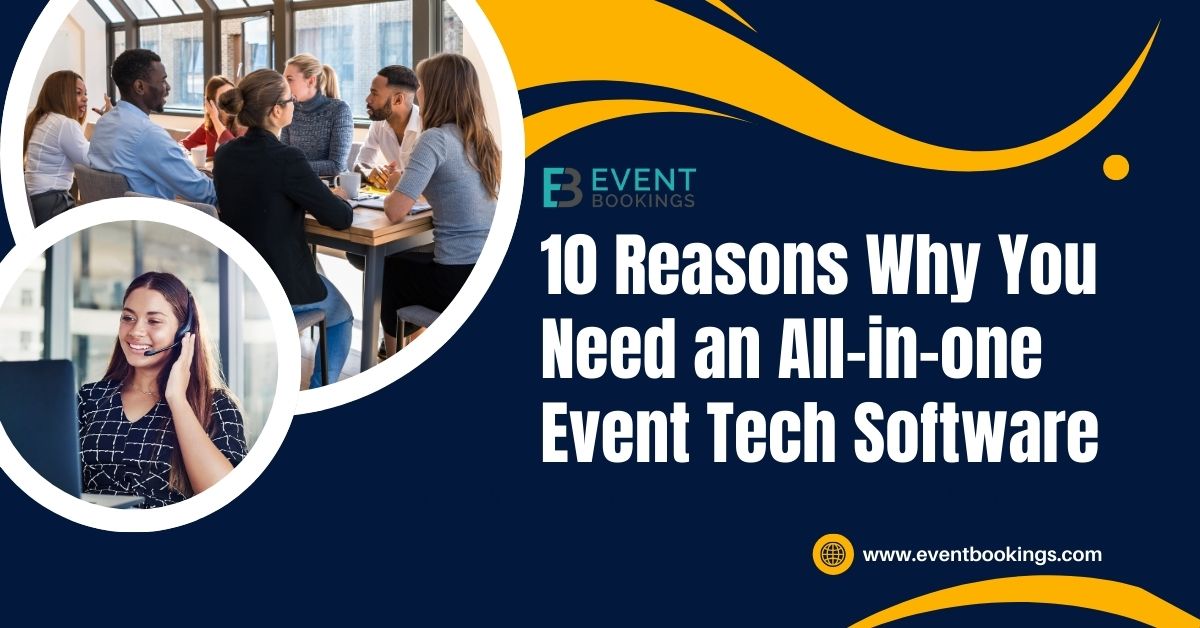In today’s fast-paced digital world, managing successful events requires more than just traditional planning methods. According to Research And Markets, the global event management software market is expected to increase at a compound annual growth rate (CAGR) of 17.4%, from USD 15.5 billion in 2024 to USD 34.7 billion by 2029. It reflects the rising demand for technology-driven solutions.
Whether it’s a virtual, in-person, or hybrid event, utilising event technology is no longer an option. It’s a necessity. All-in-one event tech software has become a game-changer, streamlining processes from registration and ticketing to post-event analytics. This article explores the top 1 reasons why adopting an all-in-one event technology service can elevate your events, improve the attendee experience, and boost efficiency.
What is Event Technology?
Event technology refers to the suite of digital tools and platforms designed to facilitate the planning, execution, and management of events. These tools streamline processes like registration, ticketing, attendee engagement, marketing, and post-event analysis, ensuring a smooth experience for both event organisers and attendees. With the ever-evolving digital landscape, event technology has become indispensable in the planning of successful events, whether in-person, virtual, or hybrid.
The Evolving Landscape of Event Tech
The field of event technology is dynamic and ever-evolving, adapting to the changing needs of both the guests and the business. Remaining competitive in the event management industry requires keeping up with the latest developments in event technology.
For example, new technologies for events saw a boom during the global epidemic. Due to this, event technology businesses were able to expand their audience reach by fast developing online platforms that imitate in-person experiences.
Even if virtual events are still important after the pandemic, event engagement technology is now focusing on different things. We are witnessing developments in mobile apps such as lead capture, badge printing and scanning, and event apps to cater to a hybrid and in-person audience.
Technological advancements like as augmented reality (AR) and artificial intelligence (AI) are increasingly found in event engagement systems. They produce immersive experiences, increase engagement, and make recommendations for tailored content. Attendee engagement with events is evolving as a result of these developments.
Ultimately, event professionals need to be up to date on the newest trends. The development of AI is personalising and streamlining events. Additionally, tech components are becoming frequently seen at conventional, in-person events. Virtual events are changing how businesses manage things like team-building and training; they’re not just about attendance.
Finally, attendees want options for entirely virtual, hybrid, or in-person experiences, so flexibility is key. Creating memorable events and maintaining your competitive edge in the industry need to keep up with the times and welcome innovation. As technology keeps changing how events are held, the future is full of fascinating possibilities.
Event Tech’s Versatility
Event technology has completely changed how events are arranged, carried out, and experienced, from intimate business get-togethers to massive conferences. It is the engine that propels creativity, effectiveness, and increased participation from attendees.
The selection of tools for event administration is wide and includes options for any requirement and taste. However, occasionally, this variety can be daunting, particularly for individuals just starting out in the event planning industry or small business owners. They could wonder which tools are really necessary for their particular event because there are so many options and features available.
It’s critical to understand that not every event calls for a full range of event technology features and that it may not be feasible to invest in excessively sophisticated equipment.
A longer learning curve and needless costs could result from this complexity, which might discourage certain users from utilising event technology to its fullest.
Adopting a complete all-in-one event management tool that simplifies the entire process is the answer for businesses that often plan events. These systems make event planning and execution easier by offering a consistent and user-friendly experience.
Benefits of All-in-One Event Technology
Everything from ticketing and event registration to marketing, attendee interaction, and data analytics is covered by all-in-one event technology. In addition to saving time and money, this feature consolidation into a single platform guarantees smooth data flow and integration between various event management facets.
Businesses can obtain a variety of tools and features on a single platform by choosing an all-in-one event technology solution. The role of technology in event management is unmatchable. This provides a consistent user experience, lowers the difficulty of administering several tools, and is also more economical.
The fundamentals of organising and carrying out events are changing due to all-in-one event technology. Let’s explore these benefits in more detail to get a fuller picture.
1. Streamlined Event Planning Process
The capacity of all-in-one event technology to expedite the event planning process is one of its primary benefits. Event planners may access all these functions from a single platform, saving them from juggling different tools and systems for activities like registration, ticketing, marketing, and communication. This ensures a smoother and more effective planning phase by saving time and lowering the possibility of mistakes and inconsistencies.
2. Streamlined Registration and Ticketing
Handling event registration and ticketing becomes a breeze with an all-in-one platform. Instead of dealing with separate tools for registrations and payments, everything happens in one seamless process. Attendees can register, buy tickets, and receive confirmations instantly. Plus, real-time updates on registration numbers give you a clear view of attendance, helping you make better decisions. Features like automated reminders and personalised messages can boost ticket sales and ensure your event is fully attended.
3. Enhanced Communication

Good communication is essential for any successful event. With an all-in-one platform, you can easily send updates, notifications, and reminders to attendees through various channels, whether it’s email, SMS, or in-app messaging. This ensures everyone is informed and up to date, reducing confusion. Real-time alerts can also be sent out during the event, keeping attendees engaged and making sure they don’t miss important announcements or sessions.
4. Effective Marketing and Promotion
Promoting your event is crucial to attracting the right audience, and an all-in-one platform makes this process much easier. These platforms typically come with built-in marketing tools like email campaigns, social media integrations, and audience segmentation features. You can create targeted marketing efforts that reach the right people at the right time. The platform allows you to monitor the success of your campaigns in real time, so you can adjust if needed to boost visibility and increase attendance.
5. Data Analytics and Insights
One of the biggest advantages of using an all-in-one event technology platform is access to comprehensive data. You can track key metrics such as registration numbers, attendee engagement, session popularity, and more. This data is incredibly valuable for understanding how your event is performing. Post-event analytics also allow you to measure success and identify areas for improvement, which helps you plan better for future events. Having this information in one place makes it easier to pull reports and analyse the event’s impact.
6. Mobile Accessibility
In today’s digital age, people want everything at their fingertips, and your event should be no different. All-in-one event platforms often include mobile apps or mobile-friendly features, allowing attendees to access event schedules and session information and network with other participants directly from their smartphones. This enhances their overall experience, keeping them engaged and connected throughout the event, no matter where they are.
7. Marketing and Promotion Tools

A successful event depends heavily on good marketing, and all-in-one event platforms offer powerful promotion tools. You can run email campaigns, manage social media advertising, and even create targeted promotions, all within the same system. This not only saves you time but ensures that all of your marketing efforts are coordinated and aligned with your event goals. With everything integrated, you can track performance and make real-time changes to increase visibility and attract more attendees.
8. Enhanced Attendee Engagement
An all-in-one event technology solution is made with event planners as well as attendees in mind. It makes it simpler for attendees to interact with the event by providing a variety of touchpoints throughout their attendance journey. Attendees enjoy a comprehensive experience that keeps them interested and happy, from registration and personalised itineraries to interactive sessions and networking possibilities.
9. Cost-Effective Solution
Cost-effectiveness is another key feature of all-in-one event tech. Through the integration of several products and services onto a single platform, firms can drastically cut costs. They are freed from having to pay for and maintain several subscriptions, which may add up quickly. By employing this economic method, organisations may spend their money more sensibly and concentrate resources on other important areas of their events.
10. Post-event Reporting and Analytics
Once your event is over, analysing the results is key to understanding its success and planning for future events. An all-in-one event platform offers detailed post-event reporting, giving you insights into everything from attendee feedback and engagement levels to ticket sales and ROI. These analytics help you evaluate what worked well and what didn’t, providing actionable insights for your next event. With all of this data easily accessible, you can continue to improve your event planning and execution over time.
Key Considerations When Choosing an All-in-One Event Technology Provider
The success of an event depends on choosing the best all-in-one event technology. Because there are so many options available on the market, it’s critical to carefully consider your options. Let’s go over the important criteria to consider when choosing a comprehensive event technology solution. This thorough guide will help you make an informed decision that properly fits your event management goals and requirements, from assessing prices to setting priorities for data protection.
Cost Evaluation
When selecting an all-in-one event tech, cost is an important consideration. Start by determining how much you can afford and being aware of how much the various solutions will cost. Consider any out-of-pocket expenses as well as any recurring ones, such membership fees or extra payments for features.
Choose event tech companies that have clear pricing structures. Uncertain pricing structures or hidden costs might result in irritation and budget overruns. To help you make an informed selection, ask for comprehensive pricing information and clarity on any potential additional expenses. To prevent unforeseen financial difficulties later on, it is crucial to have a thorough awareness of the whole cost of ownership.
Tool and Device Compatibility
Make sure the system you select works with the instruments and equipment you have or want to use. Data and information flow might be impeded by compatibility problems, which can also cause integration problems. Ascertain that there won’t be any operational hiccups by making sure the event tech platform integrates seamlessly with your current systems.
Data Security and Compliance
Data security is a non-negotiable, particularly when managing personal information about attendees. Depending on the kind of event you are hosting, give priority to software solutions that meet strict security guidelines and compliance requirements like GDPR or HIPAA. Verify that the software provider has taken strong precautions to safeguard both your data and the data of your guests.
Ease of Use and Implementation
The productivity of your event management can be greatly impacted by an intuitive interface; therefore, user-friendliness is an important consideration. Request demos or trials to evaluate the implementation and ease of use. During the onboarding process, a solution that is simple to use and navigate can save you time and money.
Customisation Possibilities
Your software should be flexible enough to meet your particular requirements, as every event is different. Take a look at the software’s customisation possibilities. A key component of providing a customised guest experience is the software’s flexibility to be customised to your event’s branding and specifications.
More freedom to customise the platform to meet your unique requirements is provided by certain software solutions. Consider how much power and customisation you want from the software.
Customer Support
If you have any enquiries or face problems with the system, you must have dependable customer support. Consider the event tech vendor’s reaction times, availability, and support channels when assessing the quality of customer service provided. In the event that problems arise, prompt and friendly customer care can help you avoid wasting time and energy.
How to Choose the Right Event Technology
The outcome of your event can be greatly impacted by the technology you choose. It’s a choice that needs careful thought and a calculated strategy. What you should do is as follows:
Evaluate Event Technology Needs
Evaluating your unique demands is a vital first step before stumbling across the vast array of event technology alternatives. Think about the purpose and scope of your event, the objectives you hope to accomplish, and the difficulties you hope to overcome. A clear framework for assessing possible solutions is provided by identifying these needs.
Determine whether you need more assistance or whether you would prefer to do things alone. While some event tech platforms have built-in support, others are entirely self-service. You should decide based on the expertise of your team and your anticipated level of help.
Gather Feedback and Peer Reviews
Use your network to get opinions and suggestions from people who have utilised new technology for events. Their observations can offer insightful viewpoints on the usefulness and practical application of various solutions.
Try the Trials and Demos
Don’t use event technology carelessly. A lot of vendors provide software samples and demos. Take advantage of these chances to experience the technology firsthand and learn how it functions. This firsthand experience might help you determine whether the programme meets your needs and works well with your workflow.
Some suppliers go over and beyond by providing product tours, which allow you to investigate their offerings without having to speak with salespeople directly. For example, EventBookings provides a brief demo so you can see an overview of the features and interface of the platform.
Get Feedback from Stakeholders
Include all pertinent stakeholders’ input in your company. Diverse needs and viewpoints regarding the perfect event technology may exist among team members. You can be sure that the technology you choose will meet the wide range of needs on your team by getting their opinions and ideas.
Last words
At last, you are prepared to make an informed choice if you have a clear grasp of your needs, peer insights, and firsthand experience with demos or trials. Consider aspects such as price, functionality, ease of use, and scalability when evaluating each choice. Select the technology that best fits your overall strategy and event goals.
Event planning and execution are made easier with EventBookings, an all-in-one event technology solution that is dependable and complete. You may add a range of crucial features to your events using EventBookings, making them flawless and memorable occasions. To find out more about how our event tech can help you enhance your events, get in touch with us.




